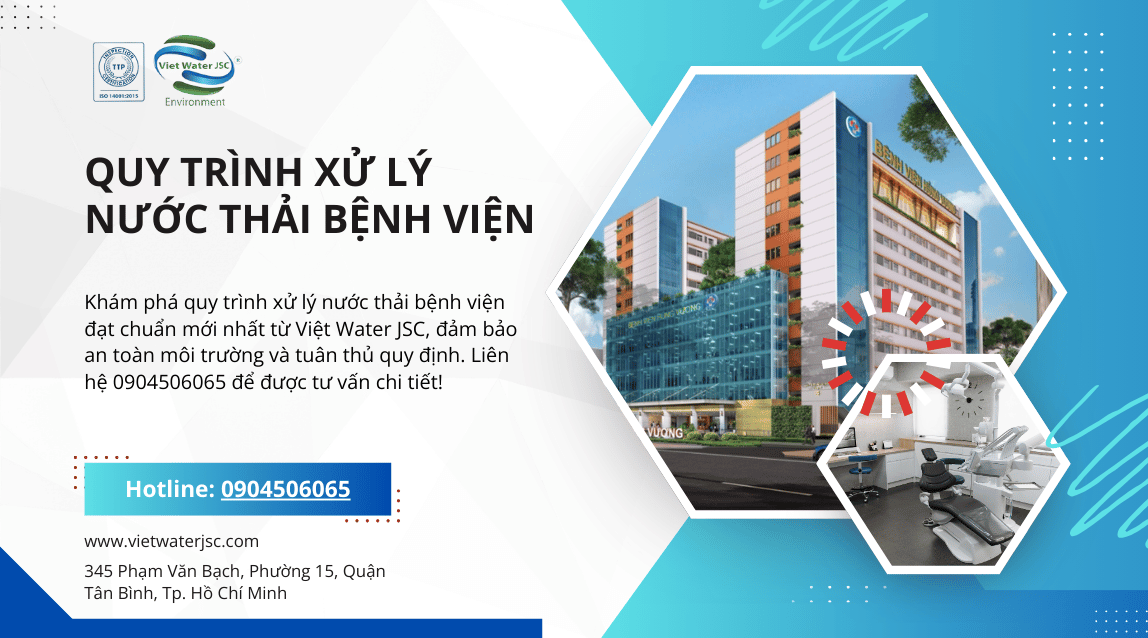THE MOST STANDARD PROCESS FOR HOSPITAL WASTEWATER TREATMENT TODAY
Hospital wastewater contains many harmful substances, pathogenic microorganisms, and chemicals that must be treated following proper procedures to ensure environmental safety and public health. In this article, we will explore the details of a standard hospital wastewater treatment process.
1. Why is Hospital Wastewater Treatment Necessary? Hospital wastewater is a complex mixture that includes:
Organic substances : Blood, bodily fluids, biological waste from treatment rooms.Toxic chemicals : Pharmaceuticals, cleaning agents, disinfectants.Pathogenic microorganisms : Highly infectious bacteria and viruses.Heavy metals : Lead, mercury from medical equipment.
If untreated, this wastewater can:
Pollute water and soil environments.
Spread dangerous diseases through water sources.
Severely impact human health and ecosystems.
2. Standard Hospital Wastewater Treatment Process 2.1. Preliminary Treatment Stage Purpose : To remove large, visible impurities.
Screening: Filters out large waste materials such as cotton, gauze, plastic bags, and solid debris.Oil and grease separator: Removes oils and grease from hospital kitchens or laundries.Primary settling tank: Separates large sediment particles to reduce the load on subsequent treatment stages.
2.2. Biological Treatment (Main Stage) Purpose : To remove dissolved organic substances and pathogenic microorganisms.
Aerobic method:
Uses Aerotank or SBR tanks where microorganisms decompose organic matter.
Continuously supplies oxygen to create a favorable environment for aerobic microorganisms.
Anaerobic method:
Utilizes UASB tanks (Upflow Anaerobic Sludge Blanket) to treat high-pollution-load wastewater.
This process breaks down organic substances without oxygen, producing biogas like methane.
2.3. Chemical Treatment Purpose : To disinfect and remove remaining toxic components.
Chemical disinfection: Uses chlorine or ozone to eliminate pathogenic bacteria and viruses.Chemical precipitation: Removes heavy metals and harmful ions using coagulants like alum, lime, or polymers.
2.4. Advanced Treatment Stage Purpose : Ensures treated wastewater meets standards before discharge.
MBR (Membrane Bioreactor) technology:
Filters all suspended solids, microorganisms, and residual organic compounds.
Activated carbon treatment: Absorbs hard-to-decompose organic compounds and odors.
2.5. Sludge Management Waste sludge from the treatment system must be collected and treated separately.
Common methods: Sludge pressing, incineration, or hygienic landfill disposal.
3. Modern Hospital Wastewater Treatment Technologies
AAO Technology (Anaerobic – Anoxic – Oxic): Energy-efficient and highly effective.Electrochemical technology: Decomposes toxic chemicals using electric currents.MBBR Technology (Moving Bed Biofilm Reactor): Enhances biological treatment efficiency with mobile carriers.
4. Legal Regulations on Hospital Wastewater Treatment According to QCVN 28:2010/BTNMT , hospital wastewater must meet the following standards before being discharged into the environment:
Chemical indicators (COD, BOD5): Must not exceed regulated thresholds.Microbial indicators: Must not contain pathogenic bacteria or viruses.Heavy metals and toxic chemicals: Must be completely removed.
Hospitals are required to regularly inspect, report, and maintain their wastewater treatment systems to comply with legal requirements.
5. Benefits of Following a Standard Hospital Wastewater Treatment Process
Environmental protection: Prevents soil, water, and air pollution.Public health assurance: Reduces the risk of disease outbreaks.Enhances hospital reputation: Demonstrates compliance and social responsibility.
6. Specialized Hospital Wastewater Treatment Services VIỆT WATER CORPORATION specializes in providing hospital wastewater treatment solutions with:
Modern technologies ensuring output quality meets QCVN standards.
Cost-efficient turnkey consulting, design, and construction.
Long-term system maintenance and upgrade support.
Consultation hotline : 0904 506 065
Share:
